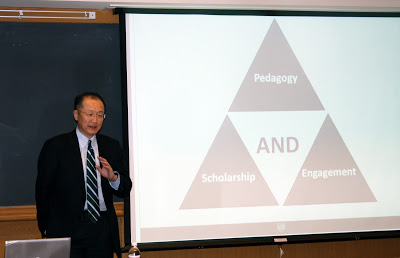- Public Policy
- Leadership
- Funding
- News & Events
- About the Center
Back to Top Nav
Back to Top Nav
Back to Top Nav
Back to Top Nav
The first term of the 2012 RLF session began with a special presentation by Dartmouth's President, Jim Kim. Kim’s presentation centered on the leadership difficulties and leadership strides he has faced during his presidency and that others have faced before him. President Kim began with a brief history of Dartmouth’s founding and the great issues Dartmouth Presidents have faced since Dartmouth’s founding. Kim began by discussing Dartmouth founders, Eleazar Wheelock and Samson Occum, and their struggles, both internally and externally, to create Dartmouth physically and academically. He moved on to speak of William Jewett Tucker’s tremendous task of modernizing the Dartmouth curriculum and making scientific strides. Then there was were Ernest Hopkins and John Dickey who helped establish Dartmouth’s PhD program. Kim wrapped up his history lesson by talking about President John Kememy’s enormous contribution of allowing women to attend the college and the implication that had.

President Kim talked to fellows about he inherited his great history when he stepped into office, and now as a leader, he has to decide what his legacy will be. One of Kim’s main interests is maintaining Dartmouth’s unique relationship between teaching and research. All Dartmouth faculty members pursue outside research in addition to teaching, an idea that is rarely realized at other institutions. Kim believes it is crucial for students to have professors to have the proper time and monetary support to be on the cutting edge of their fields. Kim also discussed his deep devotion to making the world better. Kim’s lives by the ideals that you can build a better world, that the world’s troubles are your troubles, and that there is nothing wrong with the world that better human beings cannot fix. He states that his work at Dartmouth is all centered on getting Dartmouth students to be the best they can be, so they can go out into the world and make change. Kim ended the session by saying although he has inherited all of Dartmouth’s achievements and controversies, he must always look to Dartmouth’s future and make the tough, and sometimes controversial decisions that are best for the institution and all of the Dartmouth contingencies – faculty, staff, board members, students, and alumni.
Overall, the session left fellows understanding more about inheriting leadership issues of the past and how to deal with them while also forging your own way and being helpful to society. Kim used discussion, question and answer, and lecturing to clearly communicate his ideas to the Fellows and overall the session was a huge success!
-- Anna-Kay Thomas '12